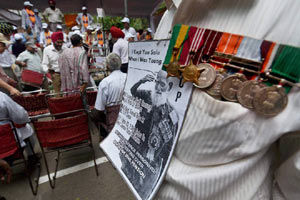The ongoing and escalating ‘one rank, one pension’ (OROP) quarrel is a classic illustration of all the ills of misgovernance that plague India. Its origins, like that of practically all of India’s ills, lie with Indira Gandhi. She decided to cut the link between Army and civilian pay in 1973. This was her way of trashing the Army which had just delivered a significant victory for the liberation of Bangladesh.
Thus, like other issues of governance, OROP has been a problem for 40-plus years. It is a fiendishly complex issue of upgrading pensions of retired army personnel. Normally, a pension is just deffered income. The amount of entitlement is a result of the yearly deduction from the employee’s pay, supplemented by the employer’s required contribution. My UK academic pension was accumulated over forty years of service with 5% from my salary and 10% from my employer. My annual pension is half of my final salary and is indexed for inflation. All over the UK, employers are finding that while the pension pot accumulates over working life, say 40 years, people are living longer and draw pension for 25 to 30 years after retirement. Pension funds cannot afford this even after prudent investment of resources. As far as I can gather, Indian public pensions are not funded out of contributions but financed out of the current revenue of the government. Whatever the pension at retirement , successive Pay Commissions upgrade the pensions. This is to compensate the pensioner for the continuous inflation which has eroded the purchasing power of the rupee ever since Independence. India does not have hyper-inflation. But arrangements such as DA and the Pay Commission upgrading make public servants, current and retired, as well as MPs and ministers, relaxed about inflation. It is people in the private sector, around 90% of the working population, who suffer the
effects of inflation. No wonder, highly-talented people become risk-averse and choose public to private employment.
The soldiers’ problem is that they have been cut off from the Pay Commission upgrading. So, they have suffered the burden of inflation the most. Even more than people in the private sector who can earn some increases in salaries and wages and don’t need to retire completely. Army personnel retire from active service at the age of 50. They can apply for transfer to other public services which can use their skills. The suitable pay scale in these second jobs is also a contentious issue as well as the pension entitlement.
Why has nothing been done about it ? My suspicion is that each defence minister who has looked at this to fulfil a promise given at election time by the politicians must have realised that the bill to meet the demands is horrendous. The more each defence minister has delayed the settlement, the higher has cost risen. Politicians, not just in India but around the world, love to give uncosted promises. What they do not reckon with is that when it comes to financial matters, there are complications across the various public services which are jealous of their relative income positions.
So, as one would expect, committees and commissions have been submitting reports. Parliament has tried to seek a solution, but no one is willing to admit that though the demand is just, it is not only going to cost a lot to meet the backlog of overdue payments but also, once granted, it will become a large and growing item in the budget. This is for a special reason which is captured in the slogan ‘one rank, one pension’. The idea can be explained by taking the example of my pension. If I had OROP, as a retired professor, my pension would be upgraded in line with the final salary of professors who have retired since. Salaries have roughly doubled since I retired. So, my pension should double as well. If granted to me and all those who retired before me and after and are still alive, my pension fund would go bust.
Governments are not supposed to go bust and the public finances of India are healthy. I guess that this is the first government which has taken the task seriously and has not only been taken aback by the huge numbers at stake but there are also cross-service wrinkles to sort out. As is usual in India, the best becomes the enemy of the good and causes delay. Even if the government concedes to the full demand, calculating the back-dated pension for each cohort that retired from 1973 to now would be a nightmare to programme. The unfounded liabilities of OROP will also need to be faced up to.
The solution, when it comes, will satisfy no one. A better way would be to double all pensions of army personnel immediately and pay up. That may give everyone time to get to the perfect solution. That may take much longer than anyone thinks.
The author is a prominent economist and Labour peer


